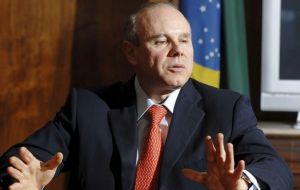MercoPress. South Atlantic News Agency
Brazil extends 6% tax on foreign loans and bonds to help weaken the Real
 Mantega decided to reduce flow of ‘speculative capital’
Mantega decided to reduce flow of ‘speculative capital’ Brazil extended on Monday a 6% tax on foreign loans and bonds issued abroad by local companies to include lending with duration of as long as five years, the third measure taken this month to weaken the Real. Since March 1, the currency has weakened 5.6%.
The 6% tax, which was originally applied to foreign borrowing of as long as two years, had already been extended on March 1 to loans and bonds with a duration of three years. The central bank the same day extended the tax to some loans granted to exporters.
President Dilma Rousseff pledged last week to take all necessary measures to protect Lain America’s biggest economy from what she dubbed a “monetary tsunami” unleashed by rich nations seeking to devalue their currencies.
The central bank is also reducing the benchmark interest rate to discourage investors seeking higher yields from entering Brazil, Rousseff told journalist Luis Nassif, who published parts of the interview on his blog.
Monday’s measure aims at reducing the flow of “speculative capital” that enter Brazil seeking higher returns than those offered by advanced economies, the Finance Ministry said in an e-mailed statement.
The higher tax on foreign loans and bonds seeks to “restrain the foreign capital inflow for short-term investments in the country,” the ministry said in the statement.
Policy makers led by central bank President Alexandre Tombini sped up the pace of interest rate cuts last week, reducing the Selic by 0.75 percentage point after cutting it by half a point at each of their previous four meetings. The bank’s board trimmed the rate to 9.75%, bringing it to less than 10% for the second time since inflation targeting was adopted in 1999.
Investors and exporters have plowed 15.5 billion dollars into Brazil since the beginning of the year, compared with an outflow of$3 billion in the last quarter of 2011, according to the central bank’s website.
Brazil’s inflation-adjusted interest rate is 3.91%, the second highest after Russia amid the Group of 20 most industrialized nations.




Top Comments
Disclaimer & comment rules-

Read all commentsCurrency war is only going to heat up more when the Federal Reserve is ready for QE3 (print money and lend against close to 0% interest rates and buys (for free) back worthless bonds from the banks that have them on their “shadow” balance sheets so they can use use fresh fiat money to gamble of the back of the tax payers on the futures market/commodities or lend it overseas at higher interest rates).
Mar 13th, 2012 - 08:05 am 0This scheme has never worked and we all know how it will end if mad people do not get what they want...(currency war leads to trade war leads to real war is chaos and solution from the same scammers who robbed us from our wealth through inflation...must history repeat itself again?) Good news is, specially when the new Pan Asian Gold Exchange in China (PAGE) goes live and restore real value of gold and silver where the banksters have no control of their manipulation.
Commenting for this story is now closed.
If you have a Facebook account, become a fan and comment on our Facebook Page!